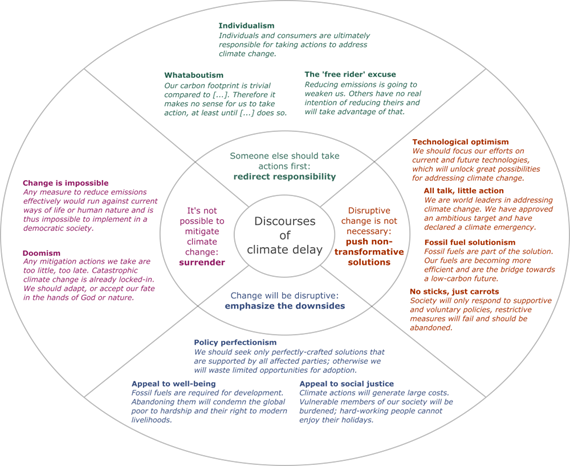
This blog post combines extracts from articles published by our German language partner website klimafakten.de, one from September 2020 and another from January 2021. It'll be the start of a series of blog posts looking more closely at the various discourses of climate delay, an insidious way to keep delaying action to combat climate change now that outright climate science denial seems to be waning.
"Discourses of Climate Delay" is the title of a study (Lamb et al. 2020), which got quite some attention upon publication. You could also call these "climate cop-outs", excuses to not having to do much against climate change. A team from the Mercator Research Institute on Global Commons and Climate Change (MCC) in Berlin had analyzed often-heard delaying arguments and put them into a taxonomy.
They found four main categories:
Redirect Responsibilities: Someone else should take action first
Propagate non-transformative solutions: Mitigate without fundamental, disruptive changes - the "not like this" excuse
Emphasize the downsides of climate policy because it would be politically and socially unjustifiable.
Surrender: stating that it's too late and that a change of course is no longer possible.
Or shorter: "Not me, not like this, not now and too late"!
Figure 1: The Discourses of Climate Delay from Lamb et al. 2020 (click image or here for larger version)
Being able to identify these discourses of climate delay and in turn not falling prey to them will become a very important skill the more discussions turn towards solving the climate crisis. According to the team of authors, many variants of such lines of argument can be found in public debates - and the goal is always the same: delay. Although climate change is acknowledged as a fundamental problem, the need for and possibilities of action are downplayed. At the same time, insufficient climate protection measures are justified by referring to (alleged or actual) negative social or economic consequences of a more ambitious climate policy. As a result, the public is given the impression that unsolvable obstacles prevent immediate climate policy intervention. Scientists often observed this approach in connection with attacks on scientists or science per se.
Supported by Mercator Research Institute on Global Commons and Climate Change (MCC) and Communication agency FLMH the Klimafakten team converted the paper's findings into a large infographic depicting the twelve main climate cop-outs. It can also be downloaded from Klimafakten as a PDF file with low resolution (1,8 MB) and high resolution (11 MB)
Figure 2: English infographic (300dpi - 1,6 MB)
In addition, a web-based game was developed with which you can test how good you are at spotting these excuses. The online quiz involves dragging speech bubbles with a total of twelve frequently heard statements on climate policy onto four figures. Each of these embodies a basic argumentation pattern: propagating measures that are too weak, emphasizing the (supposed or actual) disadvantages of climate protection instruments, passing on responsibility or capitulating prematurely to climate change. "Simply denying man-made climate change no longer works today," explains MCC researcher Lamb. "The debate is more subtle now."
Figure 3: Discourses of Delay - click on the graphic (or here) to play the game!
"The tricky thing is that there is always a grain of truth in all such claims," Lamb said when the study was published. "But these certainly relevant aspects of the climate debate often become instruments of an obstructionist strategy aimed at averting drastic measures and protecting material vested interests in the short term. This is why ambitious climate protection needs clear communication. Our study makes a contribution to this."
Have you happened upon examples of these kinds of arguments and if you did, how did you react? Let us know in the comments!
Posted by BaerbelW on Wednesday, 3 November, 2021
 |
The Skeptical Science website by Skeptical Science is licensed under a Creative Commons Attribution 3.0 Unported License. |